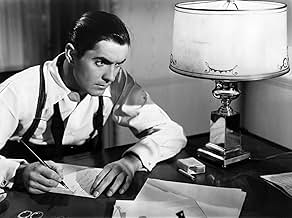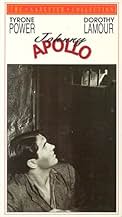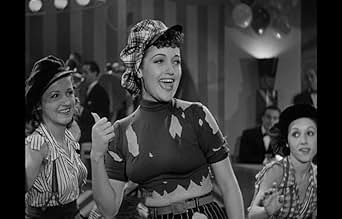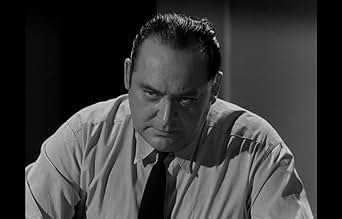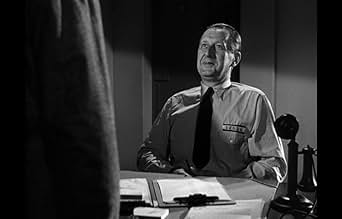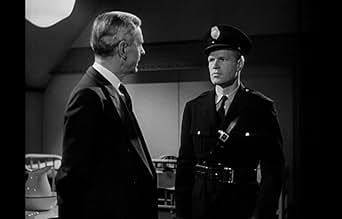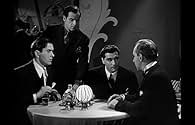VALUTAZIONE IMDb
6,9/10
1622
LA TUA VALUTAZIONE
Aggiungi una trama nella tua linguaThe son of a jailed Wall Street broker turns to crime to pay for his father's release.The son of a jailed Wall Street broker turns to crime to pay for his father's release.The son of a jailed Wall Street broker turns to crime to pay for his father's release.
- Regia
- Sceneggiatura
- Star
- Premi
- 2 vittorie totali
Selmer Jackson
- Warden
- (as Selmar Jackson)
Gary Breckner
- Announcer
- (voce)
Recensioni in evidenza
I found this to be a fairly interesting crime story, the emphasis being more on the story and less on the action. What little action there is takes place at the end of the movie.
Lloyd Nolan plays a low-key gangster and Tyrone Power plays a guy who exhibits good and bad. Dorothy Lamour, Edward Arnold, Charley Grapewin and Lionel Atwill all add to this talented cast. Lamour's tough-talking "dame" character and good cinematography helped this movie be characterized as a very early entry into the film noir genre.
The problem with the movie was the believability of the story. There were too many unanswered questions in here. Why was this person arrested? How and why could this happen, and that? There are lots of holes in here and sometimes they were so prevalent they broke up the continuity of the story.
Okay for one curious look but not worth a purchase, although it's still not available on DVD anyway, and few people buy new VHS tapes anymore.
Lloyd Nolan plays a low-key gangster and Tyrone Power plays a guy who exhibits good and bad. Dorothy Lamour, Edward Arnold, Charley Grapewin and Lionel Atwill all add to this talented cast. Lamour's tough-talking "dame" character and good cinematography helped this movie be characterized as a very early entry into the film noir genre.
The problem with the movie was the believability of the story. There were too many unanswered questions in here. Why was this person arrested? How and why could this happen, and that? There are lots of holes in here and sometimes they were so prevalent they broke up the continuity of the story.
Okay for one curious look but not worth a purchase, although it's still not available on DVD anyway, and few people buy new VHS tapes anymore.
"Johnny Apollo" is a better than average film for 1940, and it's worth watching if for no other reason than a four-minute segment in which sultry Dorothy Lamour, all dark eyes and pouty lips, sings "This Is the Beginning of the End" in a stunning, torchy alto. The song was a 1952 hit for singer Don Cornell, but his version pales beside Lamour's soulful rendition here. Her role as "Lucky" completely trumps her best known role as a foil for Hope & Crosby in the Road pictures. I have a whole new respect for her now as a singer, an artist and a sex symbol.
Embezzler Edward Arnold goes to prison and son Tyrone Power tries to make it on his own honestly. Doesn't work out well. So Tyrone decides Pop was right and that the only way to make it ahead in the world is by being a crook. So he hooks up with gangster Lloyd Nolan and falls for Nolan's girl Dorothy Lamour. When Arnold finds out what his son is up to, he's none too pleased.
Enjoyable gangster drama with a fine cast. Some have said Power is miscast. I think he's okay for the part. It's not really a gritty movie, despite the plot. Maybe if it had been a tough film noir, I could see the point that Power was wrong for the role. But it's not and he isn't. Edward Arnold is good. I doubt the man ever did a bad acting job in his career. His character is somewhat poorly written and hard to relate to, but it's difficult to dislike him due to Arnold's sympathetic performance. Nice to see Charley Grapewin playing something besides a grizzled old-timer without most of his marbles. Beautiful Dorothy Lamour is always a plus and it's good to see her in a serious role. Lloyd Nolan pretty much steals the movie as the gangster Mickey Dwyer. Lionel Atwill is largely wasted as Arnold's attorney.
The biggest flaw with the movie is that its plot isn't always consistent. Arnold's character is a crook who first treats his son like crap for not being okay with his crookedness. Then later he treats his son like crap for becoming a criminal like Dad. Still, it's an enjoyable movie. The script's got some nice dialogue. Watch for the scene where Power chases, tackles, and beats Marc Lawrence's head against the ground! Yikes!
Enjoyable gangster drama with a fine cast. Some have said Power is miscast. I think he's okay for the part. It's not really a gritty movie, despite the plot. Maybe if it had been a tough film noir, I could see the point that Power was wrong for the role. But it's not and he isn't. Edward Arnold is good. I doubt the man ever did a bad acting job in his career. His character is somewhat poorly written and hard to relate to, but it's difficult to dislike him due to Arnold's sympathetic performance. Nice to see Charley Grapewin playing something besides a grizzled old-timer without most of his marbles. Beautiful Dorothy Lamour is always a plus and it's good to see her in a serious role. Lloyd Nolan pretty much steals the movie as the gangster Mickey Dwyer. Lionel Atwill is largely wasted as Arnold's attorney.
The biggest flaw with the movie is that its plot isn't always consistent. Arnold's character is a crook who first treats his son like crap for not being okay with his crookedness. Then later he treats his son like crap for becoming a criminal like Dad. Still, it's an enjoyable movie. The script's got some nice dialogue. Watch for the scene where Power chases, tackles, and beats Marc Lawrence's head against the ground! Yikes!
Tyrone Power puts a sympathetic face on crime in his role as a young man who is drawn into the criminal underworld, after his father is imprisoned for embezzlement. While it does boast exciting action sequences, this film is not just your typical gangster movie: It goes to great lengths to show how a person, like Tyrone Power's character, who is completely disillusioned by his experiences following the discovery of his father's dishonesty, might turn to crime. Tyrone Power gives a sincere and heartfelt performance, which gives an added depth to both his role as Johnny Apollo and to the movie itself. Highly recommended to all Tyrone Power fans and those who enjoy excellent crime dramas.
Tyrone Power plays privileged young man Bob Cain, Jr., who adopts the nom de guerre Johnny Apollo when he takes to a life of crime. (Incidentally, this movie thus kicks off a string of at least a dozen crime stories of the 40s and 50s named Johnny Something-Or-Other: Eager, O'Clock, Stool Pigeon....) Power chooses crime to spite his father (Edward Arnold) by emulating his dog-eat-dog ethics, for financial tycoon Arnold has been sent to prison for embezzlement, causing a rift between the generations.
After Power's initial snit over Dad's letting him down, his attempts to secure him an early parole lead, though `connected' shantoozie Dorothy Lamour, to the underworld. The muscles he developed rowing crew in the Ivy League stand him in good stead as muscle in the mob, for soon he becomes a trusted lieutenant in Lloyd Nolan's crime family (plausibility is not the movie's long suit). But Pop (who has reclaimed his spiritual center in the Big House by welding boilers) disowns his namesake when he learns of his new line of work. In due time, of course, Power ends up behind those bars as well. But that's far from the end of the tale....
The plot of Johnny Apollo, a major production, takes a few turns too many but manages to keep a just-passable amount of credibility. Though Power, in the lead, stays less than persuasive as a menacing mobster he's too much of a pretty-boy, and lacks the acting resources to turn himself into a pretty-boy psychopath the rest of the cast compensates. Predictably, Arnold is good, as is, in the role of a mob mouthpiece with a weakness for Scotch-and-milk, Charlie Grapewin (whose first film credit falls in the last year of the 19th Century!); the two seem to be vying for title of America's sweetheart, old-codger division. Best of all is Lamour, with her sad eyes and fetching pout, who leaves an impression here of a skilled actress, more than she managed in all the Hope-Crosby `Road' pictures put together.
Direction is by Henry Hathaway, an uneven craftsman who nonetheless rose to the occasion for a handful of movies; this can be counted among his stronger efforts, along with The Dark Corner, Kiss of Death, Fourteen Hours and Niagara. But Johnny Apollo cleaves more closely to the crime melodramas of the previous decade than to the unsentimental and ambiguous style soon to come. But, in it, one can nonetheless sense particularly in its heavily shaded photography the birth pangs of film noir, struggling to come into the world.
After Power's initial snit over Dad's letting him down, his attempts to secure him an early parole lead, though `connected' shantoozie Dorothy Lamour, to the underworld. The muscles he developed rowing crew in the Ivy League stand him in good stead as muscle in the mob, for soon he becomes a trusted lieutenant in Lloyd Nolan's crime family (plausibility is not the movie's long suit). But Pop (who has reclaimed his spiritual center in the Big House by welding boilers) disowns his namesake when he learns of his new line of work. In due time, of course, Power ends up behind those bars as well. But that's far from the end of the tale....
The plot of Johnny Apollo, a major production, takes a few turns too many but manages to keep a just-passable amount of credibility. Though Power, in the lead, stays less than persuasive as a menacing mobster he's too much of a pretty-boy, and lacks the acting resources to turn himself into a pretty-boy psychopath the rest of the cast compensates. Predictably, Arnold is good, as is, in the role of a mob mouthpiece with a weakness for Scotch-and-milk, Charlie Grapewin (whose first film credit falls in the last year of the 19th Century!); the two seem to be vying for title of America's sweetheart, old-codger division. Best of all is Lamour, with her sad eyes and fetching pout, who leaves an impression here of a skilled actress, more than she managed in all the Hope-Crosby `Road' pictures put together.
Direction is by Henry Hathaway, an uneven craftsman who nonetheless rose to the occasion for a handful of movies; this can be counted among his stronger efforts, along with The Dark Corner, Kiss of Death, Fourteen Hours and Niagara. But Johnny Apollo cleaves more closely to the crime melodramas of the previous decade than to the unsentimental and ambiguous style soon to come. But, in it, one can nonetheless sense particularly in its heavily shaded photography the birth pangs of film noir, struggling to come into the world.
Lo sapevi?
- QuizIn the scene with Johnny and his father talking in the bedroom, the photo over Johnny's shoulder of his mother, is a picture of Tyrone Power's mother.
- BlooperWhen Mickey comes into the judge's offices after the judge has smashed the two whisky bottles, he comments that the room smells like a brewery. It is more likely that the room would smell like a distillery rather than a brewery and Mickey would be aware of the difference.
- Citazioni
Prisoner Tom Dugan: I steal an empty slot machine and get 10 years, and this guy steals a million and gets 5. Figure that out, will yuh?
Main Reporter: [Sarcastically] That's why you got the 10 - to figure it out.
- ConnessioniFeatured in Mai dire sì: Cast in Steele (1984)
- Colonne sonoreThis Is the Beginning of the End
(1940)
Written by Mack Gordon
Performed by Dorothy Lamour (uncredited) with Harry Rosenthal (uncredited) at piano
Played as background music often
I più visti
Accedi per valutare e creare un elenco di titoli salvati per ottenere consigli personalizzati
- How long is Johnny Apollo?Powered by Alexa
Dettagli
- Data di uscita
- Paese di origine
- Lingua
- Celebre anche come
- Johnny Apollo
- Luoghi delle riprese
- Sing Sing Penitentiary - 354 Hunter Street, Ossining, New York, Stati Uniti(exteriors: prison)
- Azienda produttrice
- Vedi altri crediti dell’azienda su IMDbPro
- Tempo di esecuzione1 ora 34 minuti
- Colore
- Proporzioni
- 1.37 : 1
Contribuisci a questa pagina
Suggerisci una modifica o aggiungi i contenuti mancanti

Divario superiore
By what name was Il prigioniero (1940) officially released in India in English?
Rispondi
